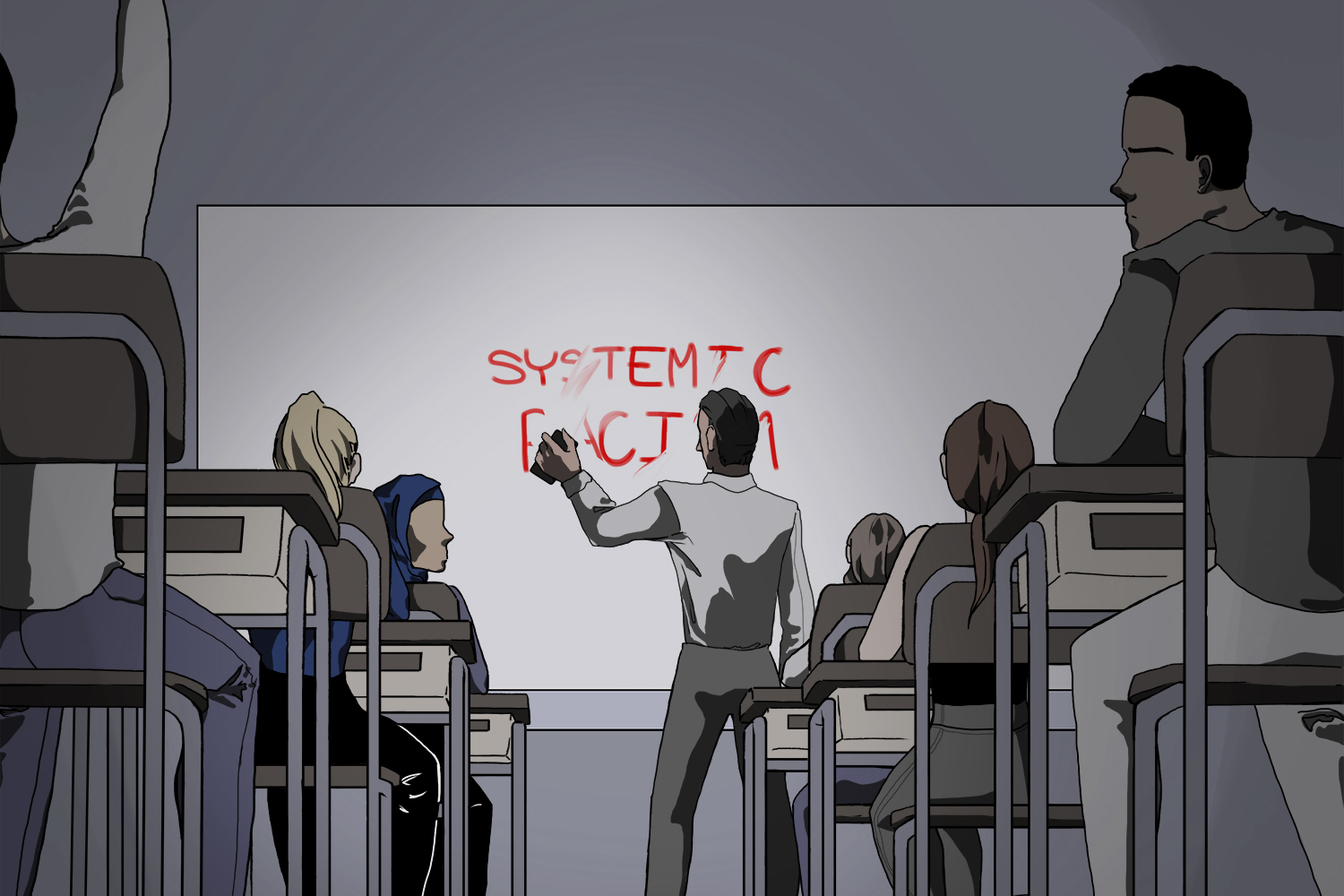Your donation will support the student journalists of Iowa City High School. For 2023, we are trying to update our video and photo studio, purchase new cameras and attend journalism conferences.
The New Laws of Teaching Race in Iowa
Recent legislation has changed the landscape of teaching teachers and teaching about racial issues in Iowa schools
October 14, 2021
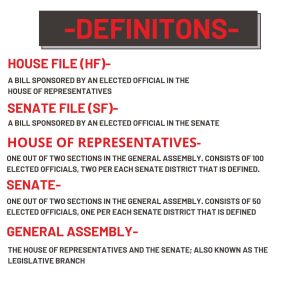
Chapter 1: Breaking Down the Bill
Earlier this year, House File 802 was passed through the Iowa Legislature. The infamous bill has set off debates amongst politicians, teachers and administrators, forcing them to evaluate the current training in place.
HF 802 prohibits the mandatory trainings contracted or facilitated by a public school district or higher-level education from teaching that “fault, blame, or bias to a race or sex, or to members of a race or sex because of their race or sex, or claiming that, consciously or unconsciously, and by virtue of persons’ race or sex, members of any race are inherently racist or are inherently inclined to oppress others, or that members of a sex are inherently sexist or inclined to oppress others” (Iowa Code 279.74)
“The superintendent must ensure ‘any curriculum or mandatory staff or student training provided by an employee of the school district or by a contractor hired by the school district does not teach, advocate, encourage, promote, or act upon specific stereotyping and scapegoating toward others on the basis of demographic group membership or identity, ” The Iowa Dept. of Ed clarified.
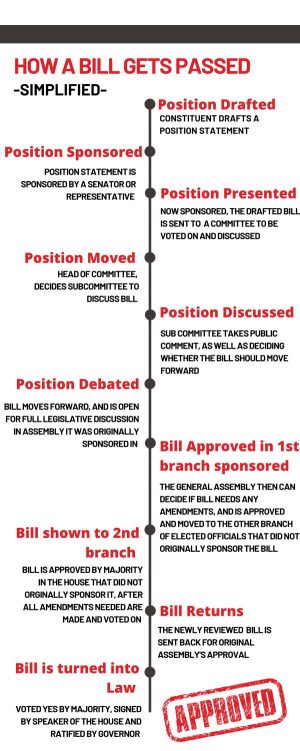
The bill also discusses specific divisive concepts in student and faculty training that must be avoided. Including that the United States of America and the state of Iowa are fundamentally or systemically racist or sexist, That an individual, by virtue of the individual’s race or sex, bears responsibility for actions committed in the past by other members of the same race or sex, and any other form of race or sex scapegoating or any other form of race or sex stereotyping
What is allowed is academic discussions on how to redress oppressive systems, as long as no student or faculty is being asked to bear responsibility for it. Teachings on systems in the U.S that were used to oppress historically are not prohibited, as long as the statement of America being fundamentally racist or sexist is not stated.
Since then, the Iowa City Community School District has put forward the following statement in regards to House- file 802. Received from Director of Equity and Employee Relations, Eric Howard.
“On June 8, 2021, Governor Kim Reynolds signed a bill that prohibits “divisive concepts” from diversity training in Iowa schools, public universities, and government agencies. The bill goes into effect on July 1, 2021. We understand that there are questions regarding how this will impact our staff training and the ability to discuss diversity, equity, and inclusion topics in our classrooms.
We want to provide clarification about how the legislation will impact the Iowa City Community School District. Most importantly, this legislation will not stop the diversity, equity, and inclusion training in our District. Our diversity, equity, and inclusion training for staff would not be considered a divisive concept because it does not “teach, advocate, act upon or promote” that an individual is inherently racist, sexist, or oppressive due to their race or sex. Our District has dedicated over six consecutive years to diversity training for our staff, including Implicit Bias and Cultural Proficiency. Our training focuses on helping all educators better understand how to manage the dynamics of diversity, and how to do the internal work to show up appropriately with all our students.
Our cultural proficiency training is wrapped in restorative practices and refrains from isolating one entity as the root cause of the systems of inequity that currently exist. We are proud of our work around diversity, equity, and inclusion within the District. We are committed to continuing this important work which is critical to our growth and our ability to recognize and respect all perspectives. If you have questions, please reach out to the District’s Diversity & Cultural Responsiveness Office at (319) 688- 1000,” Eric Howard, ICCSD Director of Equity and Employee Relations, said.
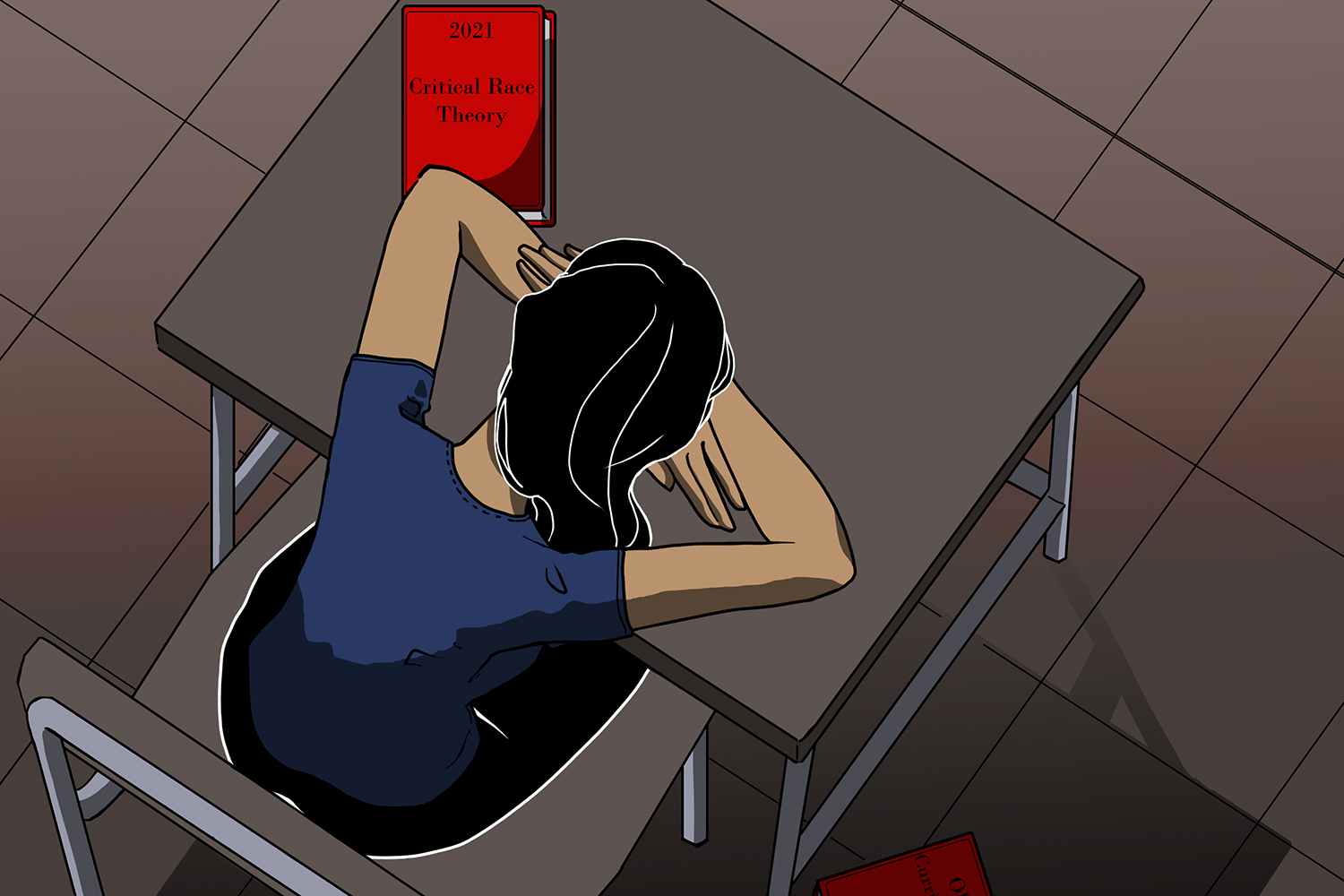
Iowa passed HF802 that limits divisive professional development of teachers and in federal institutions. It doesn’t prohibit freedom of speech in academic institutions.
Chapter 2: In the Classroom
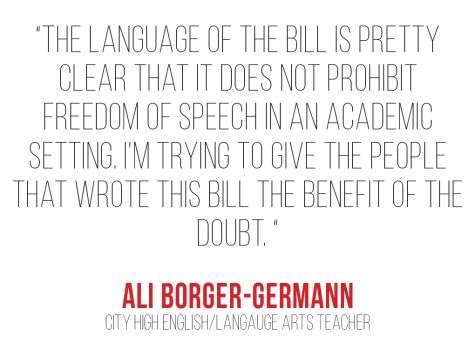
Ali Borger-Germann, City High teacher, rushed to her computer, the email she was dreading needing to send had finally become necessary. As she reluctantly signs off, a weight is lifted off her shoulders, but what came next was a highly anticipated shift in the education system of ICCSD.
“We’re seeing a lot of increased anxiety and worries, in general. I definitely think that there’s been a lot of questions about the legislation and what it means,” Ali Borger-Germann said.
Critical Race Theory is an education tool developed in the 1970’s. Using a legal framework to explain the United States and global systems, and the intersection of identity and race within them. The legal framework that characterizes the curriculum is not often applied in classrooms. Instead, terms that are often used in those lessons show up in discussions, as well as DEI (Diversity, Equity and Inclusion) training, which is what is currently being prohibited by this bill. Across the nation, bills targeting education and divisive concepts within mandated curriculum have been passed. Iowa’s state legislature has passed HF 802 that was enacted July 1, 2021.
In U.S Congress, Republicans have discussed legislation that would ban “Critical Race Theory’’ being mandated in federal institutions.
“The language of the bill is pretty clear that it does not prohibit freedom of speech in an academic setting. I’m trying to give the people who wrote this bill the benefit of the doubt,” Borger-Germann stated. “I think that they were aware that topics like this do come up in academic study no matter what you’re teaching, especially for social studies and English/ Language Arts.”
The bill was introduced early in the legislative session last year, having been drafted by Republican constituents around the state. Passing through the house with a majority vote, the bill then moved to the Senate, where it was referred to the Education Committee and sponsored by Senator Sinclair.

“A lot of the work that Laura does is still perfectly in line, there’s no conflict. In our first cultural competency training for the year, Laura actually outlined, ‘here are the things that we can no longer talk about, and here are the things we can talk about, and this doesn’t stop us from making progress in racial equity,” Borger-Germann explained. “She was very, very clear about that. And I felt like that was really reassuring.”
Paras Bassuk ‘21 Co-Chairs the Equity Advisory Committee, where Borger-Germann and Laura Gray, Director of Diversity & Cultural Responsiveness, hold seats. The Equity Advisory Committee writes Diversity and Equity recommendations for the school board with school board members J.P Claussen and Charlie Eastham in attendance at all meetings.
“We provide a combination of community perspectives, including teachers, students, community leaders, and any other interested parties that can be on this committee and give their input on district policy issues and other initiatives,” Bassuk ‘21 said when discussing the goals of the Equity Advisory Committee.
Much of the debate focuses around definitions and attempting to answer the question of what bias and education should look like. On the Left, the threat of not being able to mandatorily discuss the effects of systemic racism and its prevalence has caused concern, with confusion on what the possible impacts of this lack of knowledge will have on the next generation. On the Right, liberation from mandatory training about these topics in public school curriculum is freeing people from forcibly being “race and sex-stereotyped”, and promotes learning on how to not be racist as an individual instead of “indoctrination on the system we live in.”
“I continue to educate our teachers and support cultural proficiency with a restorative lens. The thing I won’t say is that Iowa, and/or the United States is fundamentally racist,” Gray stated. “I can refrain from saying this statement and still support diversity, equity, and inclusion in our district.”
In a pattern that has been developing for the past year, Republicans have been writing legislation prohibiting mandatory training on certain topics, mainly systemic racism and sexism, also generalized as “Critical Race Theory’’. In Ohio, HF 322 prohibited statements discussing what founded or represented America, and the concept of “unconscious bias” being taught mandatorily. In Oklahoma, a similar bill has been passed, prohibiting the use of language saying “ there is a conscious or unconscious bias when it comes towards race or sex being inherently oppressive”
“All the large districts in Iowa brought in a law firm to sort of explain ‘here’s what we think might be a problem, here’s what’s not a problem,’” Borger-Germann said. “There’s no precedent, there are no court cases around it yet. [The lawyers] were sort of inventing their own case studies and sort of testing it against the language of the law and then giving us their best interpretation.”
In the ICCSD school climate survey published June 2019, 67% of students in high school felt they had an opportunity to discuss race in the classroom. Non-white students reported significantly lower rates of seeing themselves in the curriculum, with a lack of “inclusive content” reflecting their background and identity.
“This kind of tipping point around discussing issues related to Indigenous peoples in our curriculum. I feel that part of the conversation has really gotten shut down. My kids who are in eighth and ninth grade in American Studies in our district basically have not had any conversations about that, and I don’t know that that’ll ever change now because of this law” Borger-German said.
“That’s part of our democratic process, when there’s something under debate, it’s to- tally legit to talk about it,” Borger-German said. “I wrote letters, I brought it to the district Equity Advisory Committee and asked [for us] to start thinking and planning and maybe advocating against it.”
ICCSD offers Diversity, Equity, and Inclusion (DEI) training according to the Iowa Department of Education Guidance which states, “provided such efforts are consistent with the provisions of this section, chapter 216, and other applicable law”.
Sourcing: the information used in this article is gathered from the Department of Education, as well as the Iowa Legislature Bill Book and Fast Democracy, a non-partisan database. The first part of this piece primarily focuses around House File 802 and then goes on to explore experiences with this new law among the Iowa City Community School District.
